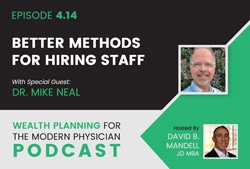In episode 4.14, host David Mandell sits down with optometrist Dr. Mike Neal. David centers this discussion on the challenges of hiring within medical practices and how Dr. Neal’s experiences with hiring difficulties in his own practice led him to create Build My Team, a service designed to assist medical practices in overcoming staffing challenges.

(Video Available April 4, 2024)
David and Mike initially cover common mistakes in the hiring process, such as relying too heavily on resumes and interviews, which, in Mike’s experience, often do not accurately reflect a candidate’s capabilities or fit for a position.
David then asks Mike to explain the importance of using assessments to identify a candidate’s natural talents and strengths, a strategy inspired by Mike’s research on the hiring practices at companies like Disney and the Four Seasons. Mike argues that traditional hiring methods are inefficient and can lead to costly turnover, advocating for a more strategic approach that prioritizes quick decision-making and the identification of candidates who are inherently suited for specific roles.
David also asks Mike to touch base on the impact of AI on modern job application processes on hiring, including the challenges employers face in navigating a landscape where candidates can apply to thousands of jobs with a single click.
The episode concludes with Mike offering advice to practice owners on improving their hiring processes and adapting to the changing dynamics of the job market.
TAKEAWAYS:
- The psychological approach to hiring can be more effective than traditional methods:Dr. Neal’s experience in the medical field led him to develop alternative methods for hiring staff. He noticed that empathetic doctors often made poor hiring decisions because they could easily be taken advantage of by candidates. This made him reconsider the traditional approach to hiring, which focuses heavily on resumes and interviews.”Early on, we were hiring wrong,” Neal explained. “The more empathetic and essentially the more wonderful a doc you are, I would argue, that the further away from hiring you should stay, because the skill set that makes you an incredible doctor is really something very challenging when you’re in an HR type role.”Neal suggested that an alternative approach is to focus on a candidate’s natural strengths and talents rather than their previous work experience. This method, he argues, can help predict whether a candidate will be successful in the role.
- Rapid hiring decisions are key to securing top talent in the medical field:One of the major challenges for medical professionals in hiring is the reduction in the number of quality applicants. Addressing this issue, Neal observed that potential hires make decisions quickly, and slow hiring practices can result in missing out on top talent. He suggested making job offers within a few hours after an applicant runs through the application process.”If you are slowly hiring now… and by the way, I’m not talking about physicians, I’m talking about team members,” said Neal. “If you’re slowly hiring your team members, you are not going to get A players. And this is what happened to us, and it was quite dramatic. We would have two to three interviews. It was almost a consensus was required before we brought on a team member. And those days are simply gone.”
- AI is transforming the hiring landscape but can also lead to inefficiencies While acknowledging that artificial intelligence (AI) is having an impact on the hiring process, Neal also warned about the challenges it brings. He pointed out that AI can sometimes result in a flood of applicants who are not necessarily a good fit for the job, leading to inefficiencies and wasted time for employers.”AI already is having an impact, and there’s a website in particular that I was shown a couple of months ago. So it’s been a while, a while in the AI timeframe, where a person could upload a resume and apply with one click to 4,000 jobs,” Neal explained. “And AI is going to build up a tsunami of that type of approach because that’s what the job applicants want. So these are people who are flocking to those types of systems because it makes their application process much, much easier.”
INSIGHTS
- The hiring process in healthcare is often flawed, leading to high turnover and staffing challenges.
- Resumes often do not accurately reflect a candidate’s true strengths and talents.
- The current job market has seen a significant decrease in applicants for “show up for work” jobs in healthcare.
- AI is already having a significant impact on hiring, with job applicants able to apply to thousands of jobs with one click.
- Hiring should focus more on a candidate’s natural talents and strengths rather than their past experience.
- The use of assessments in hiring can provide a more accurate picture of a candidate’s suitability for a role.
LINKS:
- Guest, Dr. Mike Neal Bio
- www.buildmyteam.com
- Host, David B. Mandell’s Bio

